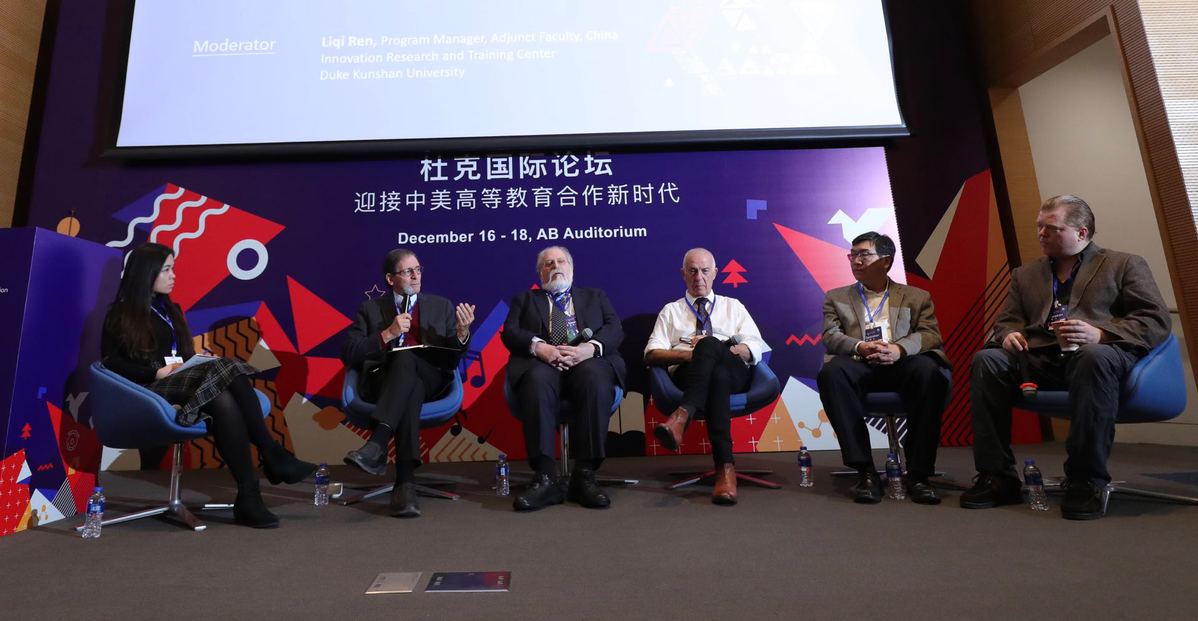Forum discusses how joint venture universities can bolster international relations
By Cao Chen in Shanghai | chinadaily.com.cn | Updated: 2019-12-18 18:19

Educators at a global forum have said that they are optimistic about the prospects of Sino-US joint venture universities boosting international relations.
"The cooperation in education will improve understanding between Chinese and American cultures, and is important for building cross-cultural knowledge and awareness," said Michael Schoenfeld, vice president for government relations and public affairs at Duke University, during the 2019 Duke International Forum held in Kunshan, Jiangsu province.
"Realistically, joint venture universities will always be a very small part of the higher education system. But it might be an opportunity for students worldwide to experience high quality education from two great global universities, and for oversea universities to learn from ideas and practices in China, which can be taken back to build better universities," he added.
Themed A New Age of Sino-US Higher Education Cooperation, the forum ran from Dec 16 to 18.
Denis Simon, executive vice chancellor at Duke Kunshan University (DKU), voiced the same sentiment.
"There is no more important time than now to nurture the joint venture universities as they are our hope for a more harmonious Sino-US relationship in the future," he said.
"One word you should know about China is 'fluidity'. The country undergoes reforms and changes. Everything is changing and you always have to judge where you're heading."
Founded in 2013, DKU is a product of a joint venture between Duke University and Wuhan University. The liberal arts and research institute is one of the nine joint venture universities that have been set up in China since 2004. Other institutes include the Xi'an Jiaotong-Liverpool University in Jiangsu province's Suzhou and the University of Nottingham Ningbo China in Zhejiang province.
Experts at the forum also said that the establishment of joint venture universities in China has been driven by a variety of factors, among which is globalization.
"There are lesser hurdles for doing things in China now as the country is further opening up, both in economy and society," said Simon.
Another factor lies in China's efforts to strengthen its focus on research and development.
The growing number of international students in China has also prompted the establishment of more joint venture universities. According to data from China's Ministry of Education, up to 500,000 international students were studying in China last year.
At New York University Shanghai, a joint venture between New York University and East China Normal University, half of the student population is made up of foreigners. Over at DKU, overseas students make up 30 percent of the total.
Designing a unique and engaging curriculum is vital to a joint venture university's success, said Simon, who shared that DKU spent more than two years analyzing the trends and development of liberal arts education before coming up with an innovative modular interdisciplinary curriculum.
"Academic freedom obviously lies at the core of the joint ventures," he added.
"At DKU, an agreement was signed by both sides to make sure this institution was able to issue a quality degree and to attain the same academic environment that exists back in the US."
Eliezer Shalev, vice chancellor of the Guangdong Technion-Israel Institute of Technology in Guangdong province's Shantou, also stressed on the importance of governmental support.
"The local government has been supportive in the development of the university, both in dealing with administrative issues and finance. As a research university, we hope more financial support can be provided for academic research," said Shalev.
























